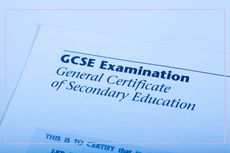GCSE revision: Study tips for every child sitting their GCSEs
Help your kids with their GCSE revision using these top 10 GCSE revision tips that every parent should know like using memory techniques and using past GCSE papers.


Help your kids with their GCSE revision using these top 11 GCSE revision tips that every parent should know, including memory techniques and using past GCSE papers.
Helping your kids with GCSE revision can be a scary thought. Especially if school wasn't your thing!
It is your teenager, however, that has to go through the pain of sitting the actual exams. Although you want to do everything you can for them, it's a frustrating reality that only they alone can get that information into their head in time for exam day.
What you can do, however, is assure them that they're not totally on their own - as we have put together a list of revision tips to help you guide them through the revision process!
Read more: Mum argues parents shouldn't boast about their children's GCSE results on social media
With such a broad range of subjects to study for, organising how to fit in time for everything from science to English revision can be daunting for your teenager.
It can be hard for kids to determine how to tailor their revision to each different subject, and your teenager might not even be aware yet of what kind of learner they are - whether they be a kinetic, visual, or auditory learner.
GoodtoKnow Newsletter
Parenting advice, hot topics, best buys and family finance tips delivered straight to your inbox.

These GSCE revision tips will help your child tap into their learning potential, and engage with their subjects in a way that will help them understand and be able to recall key facts for their exams.
These GCSE revision tips also offer a really effective way for your kid to better manage their time and put together a study schedule that works best for them, if they usually have a difficult time with organisation.
Read more: A parent's guide to GCSE results and GCSE results day
The run-up to GCSE exams can be a stressful time for both teenagers and parents alike, but with these revision tips we promise to make studying a much more manageable and, dare we say it, enjoyable experience for your child.
Here are our top 11 tips to help your child revise for their GCSEs and ease the stress of exam revision so they can achieve their full potential.
1. Post-it notes and mind maps

First things first, buy them a pack of Post-it notes.
Post-it notes dotted around the house with facts written on them are a great revision tool. They're great for 'visual learners' and can be stuck on just about anything from the fridge to the bathroom mirror.
Mind mapping is also useful to brainstorm information and help your teen remember the facts. Using bold colouring pens and big sheets of paper, mind mapping can help to break down complicated topics and pinpoint keywords. Start with a topic e.g. maths, draw branches from the word and add its key words e.g. percentages and key facts around it creating a web effect.
2. Revision books

Revision books are available for each subject and break down each topic into bite-sized chunks and diagrams to make it easier for your teen to understand. They also have question and answer sections that you can go through with them, so it's worth investing in a good revision book for any subject your child finds hard.
When you choose a GCSE revision book, go for a new edition and one that's targeted to the exam board and grade they're working towards.
CGP and Letts revision books are the most-popular choices and can be bought from WHSmith and Amazon, but if in doubt ask their teacher which books they would recommend.
3. Use memory techniques like rhyming words

We all know and love the alphabet song, which we sing to help us remember the letters of the alphabet. Well this is a perfect example of mnemonics, a revision technique that could help your teens remember difficult words, dates or names.
Word association and making up rhymes is a really useful memory tool for teens who find it hard to take in written words.
4. Use past papers for practice

Past papers from previous exams are really useful revision tools.
They can help your child to get a feel for the questions that could be asked, how they could answer them and organise their time during the exam. They could also use the past papers as a practice exams under timed conditions.
Ask their teacher for past papers or download them for free from exam board websites like aqa.org.uk, OCR.org.uk and Edexcel.com.
5. In the zone

Having their own space to revise in the house is so important.
Make sure you create a dedicated area in the house that your teen can revise in without any distractions. If they share a bedroom with a younger sibling, see if you can time revision sessions when the other one is out of the house.
6. Have a break

One of the most important things to do while revising is have breaks. Whether they're bite-sized or half-day breaks, they must be taken for your teen's brain to rest.
Breaks are a great reward system as well. Every topic they revise give them a short break. If they want to pop out for the afternoon with friends, make sure they do some revision in the morning as they probably won't want to do any when they come home.
GCSE revision tips study buddy

Some teens may find it easier to work with their friends. This can be a good way of revising as they can they'll be able to their share notes and knowledge with each other and ask each other questions from revision books.
Make sure their study buddy doesn't end up being a distraction though. Get them to teach you what they've been revising at the end of their study session, so you can see what they've been up to, while they get to go over their notes again.
8. Water and power snacks

Drinking water during revision sessions can help to ease the flow of information, as the brain works better when hydrated.
Power snacks are also important to keep both concentration and energy levels high. Some good power snacks include bananas, nuts and porridge.
9. The importance of sleep

One of the key ways to help concentration levels during revision is making sure they get the right amount of sleep, especially before an exam. Limit how long they revise for in the evenings and decide on a cut-off time so they don’t overwork themselves.
Revising can be a stressful time for your teen and if they’re finding it difficult to sleep due to stress, make sure you have a quiet word and see if you can help in any way.
10. Revision timetable

A timetable is a great way to keep on top of revision and map out what needs to be done and how long your teen has to do it in.
Make sure they have a plan of action before they begin revising and work out exactly what topics they need to revise by looking at their exam specification (syllabus), which they can get hold of from their teacher - there's no point revising a topic that won't be in the exam.
Then sit down and design a revision timetable together so you know how much they have to do. Don't forget to add in their social breaks to lighten the load!
11. Break it down

Psychologist Niels Eek from mental health app Remente says it's best to break tasks down into small and manageable components, instead of having one long to-do list.
For example, instead of saying ‘complete assignment’, try to break this down into smaller elements that you can allocate a set amount of time to, before ticking it off your list. This will help to concentrate the mind on the task at hand and prevent procrastination, which only leads to more stress and anxiety.
Where to next
- Top 10 tips on how to deal with stress
- Beat those blues with healthy superfoods
Trusted, informative, and empathetic – GoodToKnow is the ultimate online destination for mums. Established in 2007, our 15-year-strong archive of content includes more than 18,000 articles, 1,500 how-to videos, and 7,000 recipes.
-
 The 3 stages of play every parent needs to know to save their sanity (and you're probably nailing #2)
The 3 stages of play every parent needs to know to save their sanity (and you're probably nailing #2)By Dr Amanda Gummer Published
-
 Top 20 rare baby names for 2024 revealed, with some celestial and regal entries
Top 20 rare baby names for 2024 revealed, with some celestial and regal entriesParents looking for rare baby names need look no further - these 20 monikers fit the bill for being unique while remaining suitably understated.
By Lucy Wigley Published
-
 When will A-Levels be scrapped? Everything to know about the Advanced British Standard
When will A-Levels be scrapped? Everything to know about the Advanced British StandardEverything you need to know about the new qualifications that are set to replace A-Levels.
By Ellie Hutchings Published
-
 When do kids go back to school after the Christmas holidays? 2024 school holiday and term dates
When do kids go back to school after the Christmas holidays? 2024 school holiday and term datesThe key dates that you’ll want to pop on your calendar
By Ellie Hutchings Last updated
-
 How to appeal A Level results and when does clearing open?
How to appeal A Level results and when does clearing open?Find out how to appeal A Level results and when does clearing open with this helpful guide to get you through results day
By Grace Walsh Published
-
 GCSE results 2023: When are GCSE certificates issued?
GCSE results 2023: When are GCSE certificates issued?GCSE results are a nerve-wracking time, but once out the way you might find yourself asking when are GCSE certificates issued?
By Ellie Hutchings Last updated
-
 What to expect on A level results day - a parents guide
What to expect on A level results day - a parents guideWe explain what to expect on A level results day, how to understand their results and what to do if they didn't get what they wanted
By Gemma Chandler Published
-
 When do kids break up from school? Summer holidays 2023
When do kids break up from school? Summer holidays 2023It's the final term before the long summer break!
By Emily Stedman Last updated
-
 How to appeal a school place: what to do if your child doesn’t get the school you wanted
How to appeal a school place: what to do if your child doesn’t get the school you wantedGetting your child into the school you really want for them can be a nail-biting time for parents. Here's how to appeal if your child doesn't get in...
By Emily Stedman Published
-
 179 fantastic facts for kids to really blow their mind - from sharks and cats to space and tornadoes
179 fantastic facts for kids to really blow their mind - from sharks and cats to space and tornadoesDazzle and amaze little ones with these mind-blowing facts… They’re so good they’ll leave grown-ups speechless too!
By Joanne Lewsley Last updated